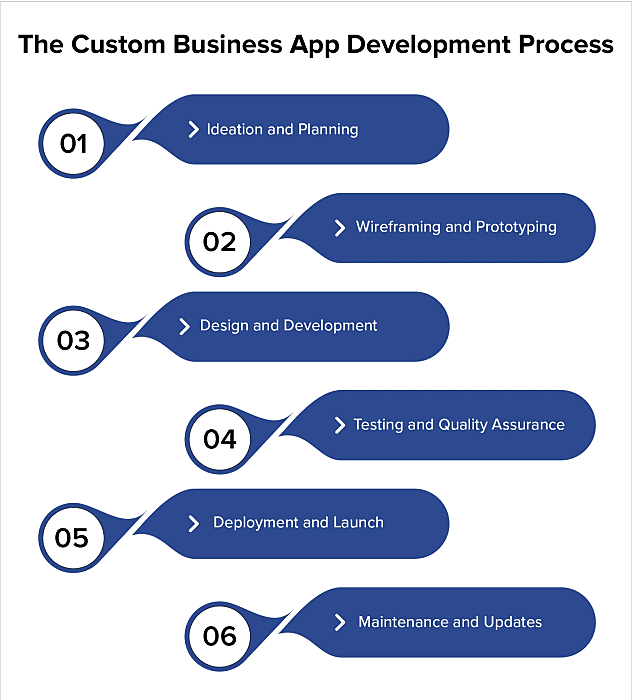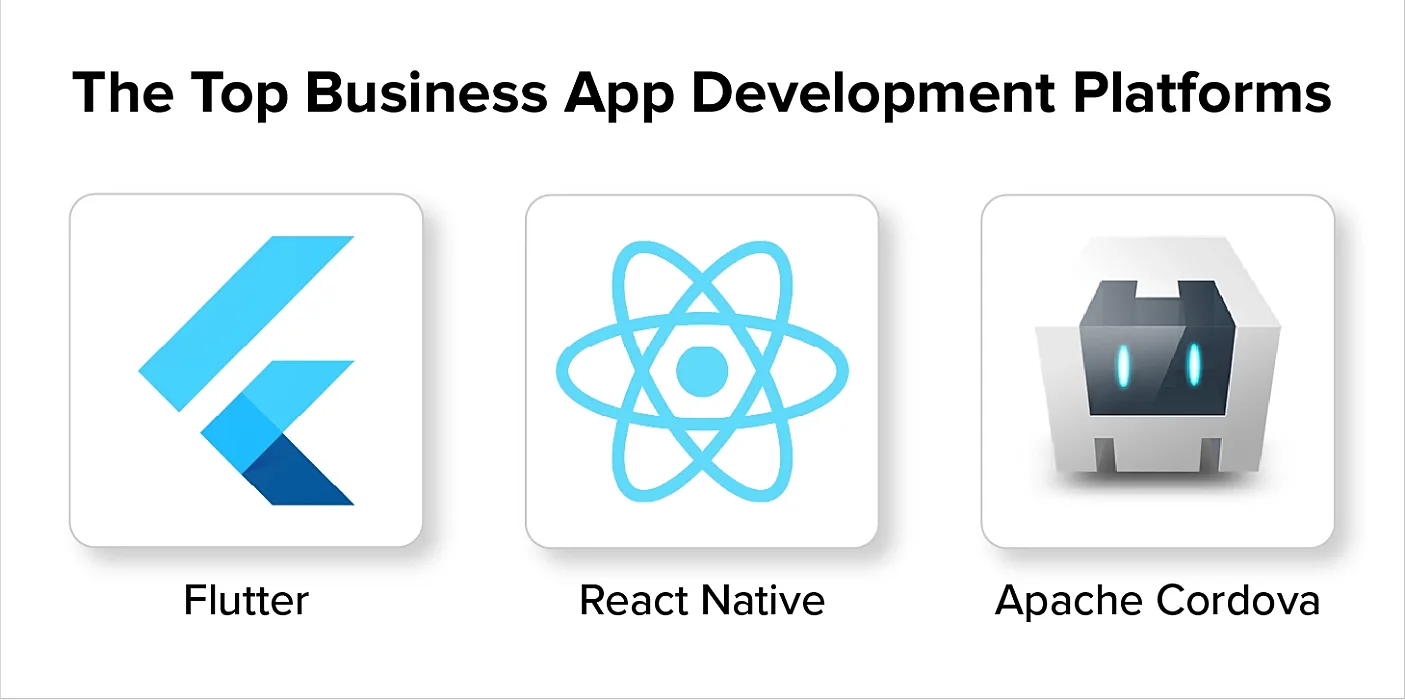
In today's digital age, having a business app isn't just an advantage; it's a necessity. The worldwide mobile app industry is expected to generate $614.40 billion in sales by 2026. With such enormous potential riches comes a great deal of responsibility to adapt to changing market norms.
From small startups to large enterprises, apps are a direct channel to customers, offering convenience and fostering engagement. Starting on the app development journey can feel overwhelming. But it's also a chance to create new things and grow your business. This guide gives you important tips to succeed in making mobile app development for business. It covers everything from boosting customer service to making more sales.
This guide is your key to unlocking the potential of business app development, simplifying complex processes into manageable steps.
Types of Business Apps
Business applications come in many types, offering different solutions to meet specific needs. They're customized to address unique problems and requirements within organizations. These apps belong to different groups, each with a particular job. They help make work better and serve customers well. These types include:
| Type of Business App | Example |
|---|---|
| Enterprise Resource Planning (ERP) Apps | SAP ERP, Oracle ERP Cloud |
| Customer Relationship Management (CRM) Apps | Salesforce, HubSpot |
| Project Management Apps | Trello, Asana |
| Sales and Marketing Apps | HubSpot Marketing Hub, Marketo |
| Productivity Apps | Microsoft 365, Google Workspace |
| Internal Communication Apps | Slack, Microsoft Teams |
| E-commerce Apps | Shopify, Magento |
1. Enterprise Resource Planning (ERP) Apps
ERP systems are comprehensive software applications. They serve as centralized hubs for managing and integrating key aspects of a business. ERP systems provide real-time access to data across departments. They handle accounting, human resources, inventory management, and supply chain operations. This enables informed decision-making throughout the company.
2. Customer Relationship Management (CRM) Apps
Building and nurturing strong client connections is paramount, and CRM apps play a pivotal role in achieving this goal. They're like a main office for handling leads. They make customers happier and keep them coming back for more.
3. Project Management Apps
Project management software and applications are essential in fostering collaboration and coordination, key elements for successful project implementation. These software tools help teams assign tasks and track progress. They make communication and teamwork easier across different places.
4. Sales and Marketing Apps
Sales and Marketing Applications are essential in driving revenue growth and maintaining competitiveness within businesses. These apps help companies find potential customers and sell their products. They also make it easier to reach specific groups of people with advertising.
5. Productivity Apps
Productivity apps and tools are essential in the fast-paced businesses to enhance efficiency. These apps help employees manage tasks, take notes, and share files. They make it easier for employees to stay organized, focused, and effective in their work.
6. Internal Communication Apps
Effective interaction and communication are fundamental to any successful organization. Apps for inner communication make sharing data, sending messages, and having virtual meetings easy. They help teams stay connected, aligned, and informed, no matter where they are.
7. E-commerce Apps
E-commerce applications have become essential in the modern era as consumers seek convenience and easy access to products and services online. Apps for inner communication make sharing data, sending messages, and having virtual meetings easy. They help teams stay connected, aligned, and informed no matter where they are. Plus, consumers today also prefer online shopping apps to get better convenience.
Real-World Examples of Popular Business Apps
Businesses use various applications in the modern digital age to increase client engagement, productivity, and operational efficiency. These applications are now essential to contemporary corporate operations, from resource management to internal communication. Here's a deeper look at a few well-known business applications that have transformed businesses.
Enterprise Resource Planning (ERP) Apps: Oracle
Oracle's ERP apps offer comprehensive solutions for managing a company's finances, supply chain, and operations. These apps help businesses automate processes, reduce costs, and improve decision-making through real-time data insights. Oracle ERP is known for its scalability and ability to support businesses of all sizes.
Customer Relationship Management (CRM) Apps: Salesforce
Salesforce leads the CRM app market by helping businesses manage and analyze customer interactions and data. It enhances customer satisfaction and loyalty by streamlining sales, marketing, and customer service processes. Salesforce's cloud-based platform allows for easy access to information, facilitating better customer relationship management.
Project Management Apps: Trello
Trello is a project management app that organizes projects into boards, lists, and cards. This intuitive system enables teams to visualize project progress and manage tasks efficiently. Trello's simplicity and flexibility make it a favorite among teams of all sizes for keeping track of projects and deadlines.
Sales and Marketing Apps: Hubspot Marketing Hub
Hubspot Marketing Hub is an all-in-one marketing platform that assists businesses in attracting visitors, converting leads, and closing sales. It offers tools for email marketing, social media marketing, SEO, and content management. Hubspot's integrated approach ensures a seamless marketing experience.
Productivity Apps: Microsoft 365
Microsoft 365 is a suite of office productivity apps, including Word, Excel, and PowerPoint. It supports businesses in creating documents, managing data, and presenting information. Microsoft 365's cloud-based service enables team collaboration in real time, boosting productivity across the organization.
Internal Communication Apps: Microsoft Teams
Microsoft Teams enhances internal communication with its chat-based workspace. It facilitates team meetings, file sharing, and project collaboration. Teams' integration with Microsoft 365 apps makes it a central hub for workplace communication and collaboration.
E-commerce Apps: Shopify
Shopify is an e-commerce platform that allows businesses to set up online stores and sell products. It offers tools for managing inventory, processing payments, and designing storefronts. Shopify's user-friendly interface and extensive features make it popular among small and large businesses looking to expand their online presence.
Understand the Custom Business App Development Process

To build an app from scratch is a complex process that requires thorough planning, precise execution, and effective teamwork. Below is a brief outline of the key steps involved in custom business app development.
Ideation and Planning
During the ideation and planning phase, the groundwork for your app's success is established. This stage includes defining the app's purpose, identifying the target audience, outlining key features, and setting overall goals. To ensure your app stands out in a competitive market, thorough market research and competitive analysis are essential at this stage.
Wireframing and Prototyping
After completing the initial planning phase, the next crucial step involves giving your app a visual form. Wireframes and prototypes are crucial here. They help you imagine how the app will look and work. These visual representations show how the app looks and works. They help get feedback and make changes before moving forward.
Design and Development
Following the approval of wireframes and prototypes, the phase of Design and Development starts the complex process. Creating an app involves making it look good with designs like icons and graphics. Also, it means writing the code for how the app works both on the front and back. An essential aspect of this stage is the integration of necessary third-party services, APIs, or databases.
Testing and Quality Assurance
The testing and quality assurance play a crucial role in the app development process. Before releasing an application, it's crucial to test it well. This helps make sure it works properly and meets quality standards. During this phase, beta testing happens with a special group of users. User acceptance testing checks if it's easy to use and if it works. Performance testing makes sure it runs smoothly and fixes any problems.
Deployment and Launch
Following extensive testing and necessary adjustments, the application is now primed for deployment. First, you release the application on app stores such as the Apple App Store or Google Play Store. Then you might also distribute it through enterprise networks, depending on who you want to reach and how you want to distribute it.
Maintenance and Updates
Even after a successful launch, the app development for business processes doesn't end. Keeping your app functional, secure, and up-to-date requires ongoing maintenance, bug fixes, and updates. These tasks are crucial to meet user expectations and incorporate the latest technologies. Regular updates can also introduce new features, improve performance, and enhance the user experience.
How Much Does Business App Development Cost?
One of the most frequently asked questions regarding business app development is, "How much will it cost?" The answer is that the cost can vary significantly depending on several factors. Let's explore some of the key elements that influence the overall cost:
App Type and Complexity
The level of complexity in your application significantly influences the cost of development. Simple apps, like a company directory or a static information platform, are usually cheaper to make. Complex apps with advanced features, integrations, and customizations tend to cost more.
Platform(s) Targeted
Developing an application for just one platform, like iOS or Android, typically costs less than creating for both platforms simultaneously. While cross-platform development can be a time and resource saver, it might also bring about added complexities and expenses.
Design and User Experience
Investing in professional UI/UX design may initially raise the total expenditure, yet proves to be a valuable venture. A carefully designed app with an easy-to-use interface can make users really satisfied. It helps them enjoy using the app more and makes them want to use it more often.
Third-party integrations and APIs
When an application needs outside services or databases, like payment systems or social media platforms, the cost of development might go up. This is because it gets more complicated, and there could be extra fees for using them.
Development Team Location
| Development Team Location | Cost Range for Basic Business App | Cost Range for Complex Apps | Considerations |
|---|---|---|---|
| Internal/Local Agency | $10,000 to $50,000 | $50,000 to $500,000+ | Higher costs potentially improve quality and communication. |
| Offshore/Independent Freelancers | Variable, often lower than local | Can vary widely | Lower costs are important to balance with quality and reliability. |
The geographical location of the mobile app development companies plays a crucial role in determining costs. Choosing an internal team or a local agency often costs more than hiring offshore teams or independent freelancers. However, choosing a development partner is important to balance cost and quality.
A basic business app usually costs between $10,000 to $50,000 to develop. That's a rough estimate of the expenses involved. For more complex apps with advanced functionalities, the cost can escalate to $50,000 to $500,000 or beyond. It is essential to consult with experienced developers or Android app development companies for accurate cost assessments according to requirements.
Additional Tips for Successful Business App Development
Here are some tips to develop a profitable app for your business:
- Turning your idea into a mobile app starts with thorough market research, which is essential for understanding people's needs, wants, and business challenges. This foundation allows for the development of mobile applications that can streamline tasks, such as tracking and managing resources, while maintaining a strong connection with customers. This step is pivotal in transforming your concept into a functional and impactful mobile app.
- Design a business application with easy navigation, smooth layouts, and attractive interfaces. Focus on making it functional and simple, choosing features that meet your business needs well. Additionally, adhering to mobile app design guidelines can enhance the usability and aesthetic appeal of your app, making it more engaging for users.
- To improve the business app, make it load faster and run smoothly. Improve the code, store data better, and rely less on networks to make it work better and satisfy users.
- Prioritizing security is essential to safeguard sensitive business data and adhere to privacy regulations. Implementing strong encryption protocols and fortified authentication methods helps protect confidential information; regular security audits minimize risks by ensuring that protective measures are effective.
- You can make money from business apps by using subscription services or selling enterprise licenses. Also, improving the app's features can attract more customers. Balancing making money with providing value is important for long-term success. It helps your business stay financially strong and grow steadily. Incorporating steps on how to build mobile apps into your strategy ensures you're not just creating an app but building a valuable asset for your business.
- Opt for mobile app development frameworks that meet the demands of business applications, like React Native, Flutter, Ionic, or Xamarin. These tools help make apps work on different devices and let developers create apps quickly. They also ensure the apps run well and help businesses make high-quality apps fast.
Business App Development Trends

The business app development industry is always changing. Development companies must keep up with the latest trends to stay ahead in the market and meet user requirements. Here are some essential trends shaping the future of business app development.
Artificial Intelligence and Machine Learning
Implementing AI and ML in apps has revolutionized app development and usage. These technologies, ranging from chatbots to predictive analytics, elevate user experience and foster innovation. Businesses can use Artificial Intelligence (AI) and ML to make smart apps that change based on how people use them. These apps give personalized experiences and help create new ideas.
Internet of Things (IoT) Integration
Businesses use the Internet of Things or IoT technology to make apps work with smart devices, sensors, and appliances. This helps automate tasks, collect info, and give a smooth experience across different ways to use apps.
Blockchain Technology
Blockchain is being used more in business apps, offering better security and transparent data storage. It's popular because it provides advanced security and stores data in a decentralized way. Blockchain technology allows enterprises to create reliable and secure applications. These applications can be used for sensitive functions such as financial transactions, supply chain management, and data exchange.
Accelerated Mobile Pages (AMP)
AMP technology, known as Accelerated Mobile Pages, enhances user experiences by speeding up loading times on mobile devices. Businesses seeking to boost their mobile presence find this innovation essential. They can use AMP implementation to make their apps and websites load quickly. This helps decrease bounce rates and increase user interaction.
Business App Development Platforms
Here are the business app development platforms with real-world business application examples:

Flutter
The Flutter app development process allows developers to build native-looking applications using a single codebase written in Dart. Google, Alibaba, and Abbey Road Studios have used Flutter to make apps. Flutter makes apps look good and work well on different devices. These Flutter apps perform like typical native apps would while requiring only one codebase, streamlining development.
React Native
Developed and supported by Facebook, React Native is an open-source framework for building cross-platform mobile apps using React. Tesla, Airbnb, Skype, and Amazon Prime use React Native to make their apps easy to use with responsive interfaces.
React Native's adaptability shines in creating engaging UIs and navigation, as demonstrated by various business application examples. These examples highlight how it helps provide users with a seamless experience. Thus, it supports its extensive acceptance and business accomplishment. It is important for businesses to know the React Native app development cost breakdown to make an informed decision.
Apache Cordova
Apache Cordova, previously known as PhoneGap, is a system that makes apps that work on many types of devices. WhatsApp, UberEATS, and Walmart are well-liked apps made with it. They use Cordova to access device features, which works well on different devices. Android and iOS mobile app development companies are rapidly increasing the adoption of Apache Cordova to build scalable business apps.
Conclusion
Embracing mobile app development is crucial for businesses to stay ahead in the competitive market. A customized mobile app boosts brand visibility and connects with customers. It also makes business tasks easier, opening up new ways to make money.
By integrating cross-platform mobile app development into their strategy, companies can develop innovative and impactful apps that are accessible on multiple devices, enhancing user experience and driving growth.
This approach complements the strategic focus on technological advancements and user-centric designs, ensuring businesses stay competitive and achieve long-term success with the broad appeal of cross-platform accessibility.
Frequently Asked Questions
-
How to create an app for business?
Creating mobile apps for businesses involves several key steps. It starts with defining the app's purpose and identifying the target audience. This is followed by conducting market research and creating prototypes to refine the concept. Choosing the right development approach is important. It involves designing a user-friendly interface, adding features, and testing everything carefully. After deployment to app stores, promotion and continuous maintenance, including updates, are essential for the app's success and relevance.
-
How much does it cost to develop a business app?
-
What are the benefits of mobile apps for business?
















